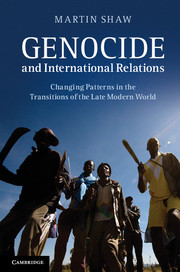Book contents
- Frontmatter
- Dedication
- Contents
- Acknowledgements
- Introduction
- Part I Perspectives
- Part II Twentieth-century genocide
- 4 European genocide: inter-imperial crisis and world war
- 5 The 1948 Convention and the transition in genocide
- 6 Cold War, decolonization and post-colonial genocide
- 7 The end of the Cold War and genocide
- Part III New patterns of genocide
- Bibliography
- Index
6 - Cold War, decolonization and post-colonial genocide
Published online by Cambridge University Press: 05 June 2014
- Frontmatter
- Dedication
- Contents
- Acknowledgements
- Introduction
- Part I Perspectives
- Part II Twentieth-century genocide
- 4 European genocide: inter-imperial crisis and world war
- 5 The 1948 Convention and the transition in genocide
- 6 Cold War, decolonization and post-colonial genocide
- 7 The end of the Cold War and genocide
- Part III New patterns of genocide
- Bibliography
- Index
Summary
In this chapter I explore transformations of the international system during the Cold War period and their implications for genocide. The transition in genocide in the 1940s reflected significant changes in the international system itself. One was the United Nations, conceived by the victorious powers as a more ambitious replacement for the defunct League of Nations, and the raft of global economic institutions developed by the USA and Western states after 1945. There had been a secular growth of international institutions during the inter-imperial era (Murphy 1994), but the post-1945 world saw their qualitative expansion, despite Cold War rivalries. Neither bloc could dispense with them and soon they provided fora for the many new independent states. Nevertheless, there were tensions from the very beginnings of the UN in the wartime alliance, as the incipient superpowers combined ambitions for a new international order with preparations for rivalry. Relations both among major imperial powers and between them, other states and societies were drastically changed in what came to be seen as a Cold War international system. These changes and the processes of change had profound consequences for the pattern of genocide.
The changing international system: the Cold War and genocide
The ‘world’ wars that had produced extensive genocide represented two quickly succeeding crises of the inter-imperial system, which radically changed its composition and dynamics. The First World War led to the end of the old East European empires and the emergence of smaller nation-states in central, eastern and south-eastern Europe. The Second led directly to the end of the German, Japanese and Italian empires and indirectly to the end of the British, French and other European empires, which except for the Portuguese were dismantled by the mid 1960s. Thus the first war left a large number of rival empires – Britain, France, the USA, Japan, Germany (although it lost its colonies) and the USSR (which quickly restored much of the Tsarist empire) – intact as autonomous centres of military-political power. The second war, in contrast, subordinated not only the defeated German and Japanese but also the ‘victorious’ but indebted British and French militarily and economically to the USA. The latter became the centre of a gigantic Western political, military and economic bloc, while the USSR established its own (repressively quasi-imperial) bloc among its ‘satellites’ in Eastern Europe.
- Type
- Chapter
- Information
- Genocide and International RelationsChanging Patterns in the Transitions of the Late Modern World, pp. 98 - 123Publisher: Cambridge University PressPrint publication year: 2013



